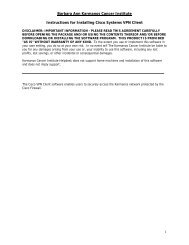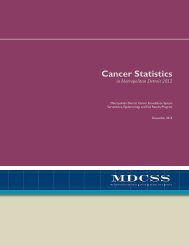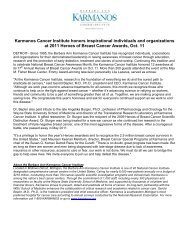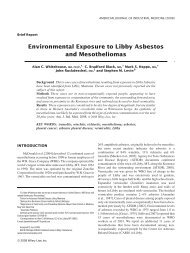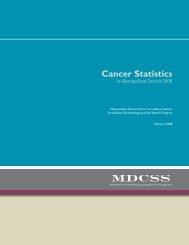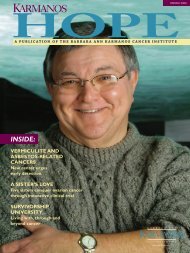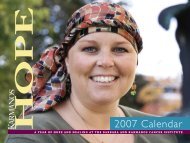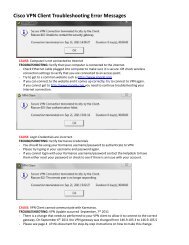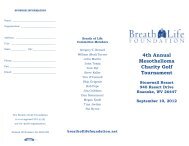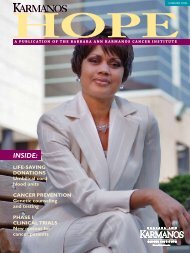Regular self-exams will help you become familiar with what is ...
Regular self-exams will help you become familiar with what is ...
Regular self-exams will help you become familiar with what is ...
Create successful ePaper yourself
Turn your PDF publications into a flip-book with our unique Google optimized e-Paper software.
B A R B A R A A N NC ANCER INSTITUTEWayne State UniversityTESTICULAR HEALTHPromoting cancer awareness & early detectionTaking Control of Your HealthCancer <strong>is</strong> most curable in its early stages. At the Barbara Ann Karmanos Cancer Institute,we know that routine screenings save lives every day. Advocate for <strong>you</strong>r healthand talk <strong>with</strong> a health care provider about a testicular examination.What <strong>is</strong> testicular cancer?• Testicular cancer <strong>is</strong> the growth of cancer cells in oneor both of the testicles.• The testicles are located in the scrotum and producetestosterone.• Testicular cancer <strong>is</strong> the most common form of cancerin men between the ages of 15 and 35.• Testicular cancer <strong>is</strong> one of the most treatable andcurable forms of cancer.Who can get testicular cancer?• Men ages 20-54 are the most likely age group todevelop testicular cancer.<strong>Regular</strong> <strong>self</strong>-<strong>exams</strong> <strong>will</strong> <strong>help</strong> <strong>you</strong><strong>become</strong> <strong>familiar</strong> <strong>with</strong> <strong>what</strong> <strong>is</strong>normal and <strong>what</strong> <strong>is</strong> differentfor <strong>you</strong>r body.• Any man can develop testicular cancer, althoughthere are certain factors that increase <strong>you</strong>r r<strong>is</strong>k.R<strong>is</strong>k factors include:• H<strong>is</strong>tory of an undescended testicle. The r<strong>is</strong>k doesnot change even after surgery.• Abnormalities of the testicles, pen<strong>is</strong> or kidneys, aswell as those <strong>with</strong> inguinal hernia (hernia in thegroin area, where the thigh meets the abdomen).• A h<strong>is</strong>tory of testicular cancer, increasing the r<strong>is</strong>k ofdeveloping cancer in the other testicle.• A family h<strong>is</strong>tory of testicular cancer.What are the symptoms of testicular cancer?• A painless lump or swelling in a testicle.• An enlarged testicle, or a change in the way atesticle feels.• A dull ache in the lower abdomen or groin.• A feeling of heaviness or pain in the scrotum.• Swelling or tenderness of the breast.
How do I get checked for testicular problems?• All men should perform a monthly testicular <strong>self</strong>examination,especially if they have any of theknown r<strong>is</strong>k factors.• Have a yearly testicular examination as part of ageneral physical examination by a health careprovider.How do I lower my r<strong>is</strong>k for testicular cancer?• Perform regular <strong>self</strong>-<strong>exams</strong> and be sure <strong>you</strong>r healthcare provider examines <strong>you</strong>r testicles as part of aphysical.Be aware of changesin <strong>you</strong>r testicles. See ahealth care provider every yearand d<strong>is</strong>cuss <strong>you</strong>r cancer r<strong>is</strong>kand screening needs.*Th<strong>is</strong> information <strong>is</strong> intended to serve as guidelines only. Screening needs vary for each individual depending on <strong>you</strong>r overall cancer r<strong>is</strong>k.Please consult <strong>with</strong> a physician to decide <strong>what</strong> screenings are right for <strong>you</strong> and to make an informed dec<strong>is</strong>ion.Did <strong>you</strong> know? The five-year relative survival rate for all men <strong>with</strong> testicular cancer <strong>is</strong> 95 percent.FOR MORE INFORMATIONIf <strong>you</strong> would like to learn more about any of these topics, please v<strong>is</strong>it Karmanos.orgor call the Patient & Community Education department at 1-800-527-6266.Information <strong>you</strong> can trust <strong>is</strong> also available from the following sources:American Cancer Society877-ACS-2345Cancer.orgNational Cancer Institute800-4-CANCERCancer.govB A R B A R A A N NC ANCER INSTITUTEWayne State University1-800-KARMANOS | karmanos.orgJune 2011



